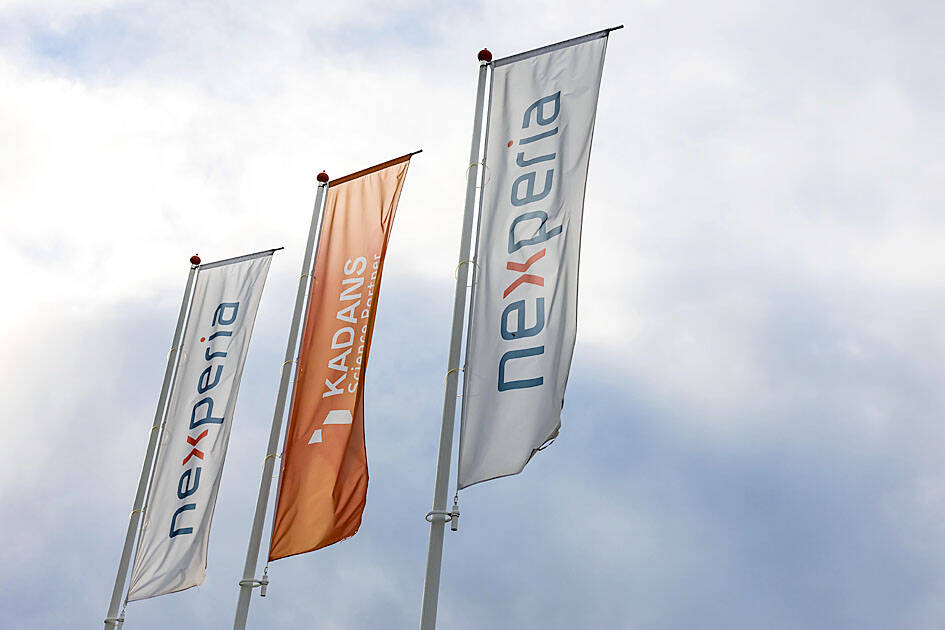Chinese semiconductor firm Wingtech Technology Co (聞泰科技) yesterday said it would seek help from Beijing and vowed to protect its interests, after Dutch authorities intervened over its European subsidiary Nexperia Holding NV.
Officials in the Netherlands invoked the Goods Availability Act to take control of Dutch-based chip maker Nexperia late last month, citing national security concerns, the Dutch government said in a statement on Sunday.
That means that while the company — based in Nijmegen, Netherlands — can continue regular production, its decisions can be blocked or reversed by the Dutch government.

Photo: EPA
The move was due to “recent and acute signals of serious governance shortcomings and actions” within Chinese-owned Nexperia, the statement said.
“These signals posed a threat to the continuity and safeguarding on Dutch and European soil of crucial technological knowledge and capabilities,” it said.
Wingtech said it was engaging with “relevant government departments to secure support” following the decision.
The company is discussing legal remedies and measures with international law firms, it said in a filing published on the Shanghai Stock Exchange.
It vowed to “take all necessary actions to maximize the protection of the legitimate rights and interests of the company and all shareholders.”
Once part of Dutch electronics giant Royal Philips NV and its semiconductor spin-off NXP Semiconductors NV, Nexperia was eventually bought by Wingtech in 2018.
It makes chips for everyday goods such as cars and refrigerators.
“China always opposes overstretching the concept of national security and discriminatory moves that target companies from certain countries,” Chinese Ministry of Foreign Affairs spokesman Lin Jian (林劍) said at a regular news briefing in Beijing yesterday. “China is firmly resolved in defending its own legitimate and lawful rights and interests.”
Semiconductors have become a key battleground between China and the West.
The US and the Netherlands are among the powers that have imposed restrictions on exporting advanced chipmaking equipment to China, fearing Beijing could use it to make cutting-edge weapons.
Wingtech was put on one of Washington’s “entity lists” in December last year, meaning it had been determined by the government to be acting contrary to the national security and foreign policy interests of the US.
Additional reporting by Bloomberg

Shiina Ito has had fewer Chinese customers at her Tokyo jewelry shop since Beijing issued a travel warning in the wake of a diplomatic spat, but she said she was not concerned. A souring of Tokyo-Beijing relations this month, following remarks by Japanese Prime Minister Sanae Takaichi about Taiwan, has fueled concerns about the impact on the ritzy boutiques, noodle joints and hotels where holidaymakers spend their cash. However, businesses in Tokyo largely shrugged off any anxiety. “Since there are fewer Chinese customers, it’s become a bit easier for Japanese shoppers to visit, so our sales haven’t really dropped,” Ito

The number of Taiwanese working in the US rose to a record high of 137,000 last year, driven largely by Taiwan Semiconductor Manufacturing Co’s (TSMC, 台積電) rapid overseas expansion, according to government data released yesterday. A total of 666,000 Taiwanese nationals were employed abroad last year, an increase of 45,000 from 2023 and the highest level since the COVID-19 pandemic, data from the Directorate-General of Budget, Accounting and Statistics (DGBAS) showed. Overseas employment had steadily increased between 2009 and 2019, peaking at 739,000, before plunging to 319,000 in 2021 amid US-China trade tensions, global supply chain shifts, reshoring by Taiwanese companies and

Taiwan Semiconductor Manufacturing Co (TSMC) Chairman C.C. Wei (魏哲家) and the company’s former chairman, Mark Liu (劉德音), both received the Robert N. Noyce Award -- the semiconductor industry’s highest honor -- in San Jose, California, on Thursday (local time). Speaking at the award event, Liu, who retired last year, expressed gratitude to his wife, his dissertation advisor at the University of California, Berkeley, his supervisors at AT&T Bell Laboratories -- where he worked on optical fiber communication systems before joining TSMC, TSMC partners, and industry colleagues. Liu said that working alongside TSMC

TECHNOLOGY DAY: The Taiwanese firm is also setting up a joint venture with Alphabet Inc on robots and plans to establish a firm in Japan to produce Model A EVs Manufacturing giant Hon Hai Precision Industry Co (鴻海精密) yesterday announced a collaboration with ChatGPT developer OpenAI to build next-generation artificial intelligence (AI) infrastructure and strengthen its local supply chain in the US to accelerate the deployment of advanced AI systems. Building such an infrastructure in the US is crucial for strengthening local supply chains and supporting the US in maintaining its leading position in the AI domain, Hon Hai said in a statement. Through the collaboration, OpenAI would share its insights into emerging hardware needs in the AI industry with Hon Hai to support the company’s design and development work, as well